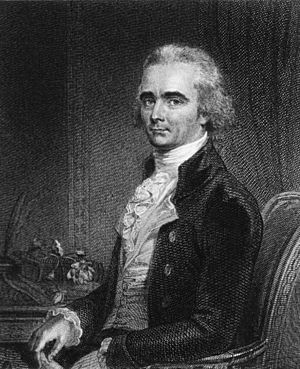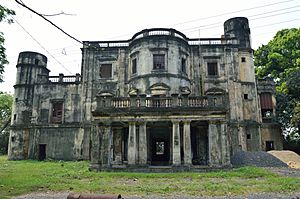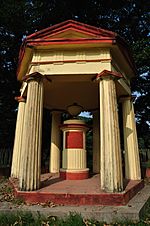William Roxburgh facts for kids
Quick facts for kids
William Roxburgh
|
|
|---|---|

Engraving by Charles Turner Warren
|
|
| Born | 29 June 1751 Underwood, Craigie, Ayrshire
|
| Died | 10 April 1815 (aged 63) Park Place, Edinburgh
|
| Nationality | Scottish |
| Scientific career | |
| Fields | surgeon, botanist |
| Doctoral advisor | John Hope |
| Author abbrev. (botany) | Roxb. |
William Roxburgh (born 1751, died 1815) was a Scottish surgeon and plant expert. He spent much of his life working in India. He is often called the "father of Indian botany."
Roxburgh studied many plants and wrote books about them. Indian artists helped him by drawing beautiful pictures of the plants. Many plants were even named after him!
Contents
Early Life and Education
William Roxburgh was born on June 3, 1751, in a place called Underwood in Scotland. He grew up in Ayrshire.
He went to school in his local area. He also had private lessons in Latin. This helped him later with his scientific writings.
Roxburgh studied medicine at Edinburgh University. He learned about surgery from Dr. Alexander Monro. He also studied plants with John Hope, a famous botanist. His studies included math and physics. These subjects helped him with his later work on plants.
In 1772, he became a surgeon's helper on a ship. This ship belonged to the British East India Company. He traveled to Madras and other ports in India. In 1776, he earned his first medical degree from Edinburgh University.
He joined the medical service in Madras in 1776. He became a full surgeon in 1780.
His Work in India
Roxburgh started working in the Carnatic region of India in 1781. He became the main plant expert for the East India Company in Madras in 1789.
Studying Plants in Samalkot
His first major work was at the Samalkot garden. Here, he studied plants that could be useful for people. This is called economic botany.
He hired local artists to draw the plants. By 1790, he had collected 700 amazing plant illustrations.
Leading the Calcutta Botanical Garden
In 1793, Roxburgh was asked to lead the Indian Botanical Gardens in Calcutta. This was a very important job. He worked hard to make the garden better.
He created a list of all the plants in the garden in 1814. This list was called Hortus Bengalensis.
Publishing His Discoveries
Roxburgh sent many of his plant drawings to Sir Joseph Banks in England. Banks started publishing a book called Plants of the Coast of Coromandel. This book had over 300 drawings and descriptions of plants. It was published in three volumes.
Weather and Climate Studies
Roxburgh also collected a lot of information about the weather. He took measurements three times a day. He used special tools like barometers and thermometers.
He was one of the first people to collect such detailed weather data in the tropics. His work helped him understand famines and climate changes in India.
Other Important Work
He became a member of the Asiatic Society. He wrote many important papers for them. One paper was about the lac insect, which makes a substance called lac.
Later Life and Recognition
In 1813, Roxburgh returned to Scotland because he was not well. On his way, he stopped at Saint Helena island. Even though he was sick, he made a list of all the plants there. This list was very important.
He passed away in Edinburgh on February 18, 1815. He was buried in Greyfriars Kirkyard.
Awards and Honors
Roxburgh received many honors for his work. In 1791, he became a Fellow of the Royal Society of Edinburgh. In 1799, he joined the Linnean Society.
In 1802, he became a member of the American Philosophical Society in Philadelphia.
He received gold medals from the Society for the Promotion of Arts. He got one in 1805 for his work on plants from the East. He received another in 1803 for his studies on how trees grow in India. In 1814, he received a third gold medal.
Plants Named After Him
After he died, his friend William Carey published Roxburgh's book, Flora Indica. This book described many Indian plants.
A beautiful rose was named after him: Rosa roxburghii. Roxburgh had first named it Rosa microphylla. But the name was changed in 1823 to honor him.



